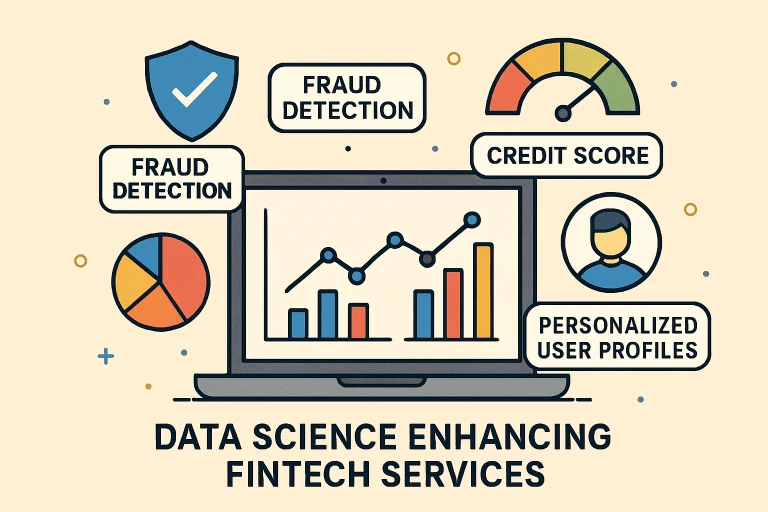
Table of Contents
Key Takeaways
- Data science powers real-time fraud detection and prevention across fintech platforms.
- Advanced analytics drive improved risk assessment, expanding financial inclusion.
- Personalization strategies enhance both customer experience and engagement.
- Predictive analytics optimizes portfolios, informing smarter investment strategies.
- Compliance processes are streamlined, reducing costs and regulatory risks.
Introduction
The financial technology sector is dramatically transforming, powered by data science’s ability to turn raw information into actionable insights. Companies are leveraging advanced algorithms and vast datasets to drive innovation, enhance customer experiences, and strengthen the security of financial transactions. In an industry where agility and informed decision-making are critical, leaders such as David Johnson Cane Bay Partners exemplify how data-driven strategies can streamline fintech operations and set new standards for the market. By harnessing machine learning and artificial intelligence, fintech organizations not only mitigate risks but also anticipate consumer needs and regulatory shifts with precision.
This data-centric approach reshapes how financial service providers interact with clients, address cyber threats, and ensure compliance with evolving regulations. As fintech increasingly relies on powerful analytics, the role of experts who can interpret and apply these data insights grows ever more vital. The success of industry leaders demonstrates the progressive edge gained through effective implementation of data science, laying the foundation for more secure, responsive, and innovative financial ecosystems.
Enhancing Fraud Detection and Cybersecurity
With the proliferation of digital transactions comes an increase in sophisticated cyber threats. Fintech companies rely on consulting data science to implement stringent security protocols, utilizing real-time analytics to detect irregular activity and prevent fraud. Machine learning algorithms scan millions of transactions, identifying suspicious patterns based on deviations from historical norms. These systems can trigger instant alerts, allowing for immediate intervention and proactive responses to new types of attacks. According to Forbes, AI-powered fraud detection not only stops breaches in real-time but helps institutions evolve their defenses as cybercrime tactics advance, ultimately protecting both consumer data and company reputation.
Improving Risk Assessment and Credit Scoring
Risk assessment has moved beyond traditional indicators like credit history or income reports. Today’s fintech companies analyze alternative data sources—ranging from social media behavior to mobile device usage—to build more inclusive and comprehensive credit profiles. Using big data, lenders can identify creditworthy customers that conventional models might overlook. This innovation broadens access to financial products while enabling lenders to tailor offers more precisely, supporting greater financial inclusion and personalized service design.
Personalizing Financial Services
Modern consumers demand tailored experiences from their financial institutions. Companies such as those from Cane Bay Virgin Islands can develop products and services that adapt to individual customer needs and behaviors by applying advanced data analytics. Features like predictive budgeting tools, dynamic overdraft protection, and customized investment recommendations all stem from deep learning on customer data. These personalized interactions, such as the suggestions made by AI-backed apps, not only improve user satisfaction but also foster stronger loyalty. McKinsey & Company reports that banks implementing data-driven personalization have seen greater user engagement and retention than those using generic service models.
Optimizing Investment Strategies with Predictive Analytics
Harnessing the power of historical and real-time data, fintech innovators use predictive analytics to refine investment strategies. Algorithms sift through years of market data, economic indicators, and risk variables to develop recommendations and execute trades at speeds beyond human capability. Solutions like algorithmic trading drive efficiency, reduce risks, and seize market opportunities at the optimal moment. These data-informed decisions enable fintech firms to optimize portfolio growth and provide more stable investment advice to their clients.
Streamlining Regulatory Compliance
Fintech companies operate within a constantly evolving regulatory landscape. Data science provides a means to automate compliance, improving accuracy while reducing operational overhead. Natural language processing systems, for example, rapidly scan regulatory updates and flag relevant changes, helping firms avoid penalties or reputational risks. Transaction monitoring and automated reporting not only minimize human error but also support transparency in line with global best practices. By integrating regulatory technology solutions, firms like Goldman Sachs are able to maintain agility while navigating complex compliance challenges.
Also read: Five Apps to Have for Your Pets with Paws
Driving Growth in Fintech
Data science does more than fine-tune operations and enhance security; it actively fuels growth by revealing shifts in customer preferences and market opportunities. Fintech leaders use sophisticated analytical models to interpret feedback, evaluate product performance, and identify new revenue streams. With these insights, they can swiftly adapt their services, target underserved segments, and launch new offerings ahead of the competition. This continuous innovation is essential for capturing new audiences and achieving greater market share in the face of rapidly changing financial behaviors.
Tools and Technologies in Fintech Data Science
Tools like Python, R, and major machine learning platforms are mainstays in the fintech data science stack. Cloud-based solutions enable elastic scaling for storage and analytics, meeting the infrastructure demands of high-frequency trading or mass-market digital banking. These technologies support quick prototyping and deployment, so fintech companies can remain nimble while scaling globally—an imperative as transaction volumes surge and consumer expectations heighten.
Emerging Trends in Data Science for Fintech
The next wave of fintech innovation is marked by AI-powered personalized banking and growing blockchain adoption for transaction security. AI can now deliver real-time financial guidance, automate savings, or predict spending, revolutionizing how consumers interact with their finances. At the same time, blockchain provides an immutable, transparent foundation for global payments and identity verification. As fintech firms continue to adopt these technologies, they are redefining industry standards and raising the bar for customer-centric service and operational excellence.
Data science is the cornerstone of fintech’s ongoing evolution, enabling better fraud protection, more accurate credit assessments, tailored services, and agile compliance. As industry pioneers have shown, those who invest in advanced analytics and predictive modeling are set to shape the future of finance for years to come.